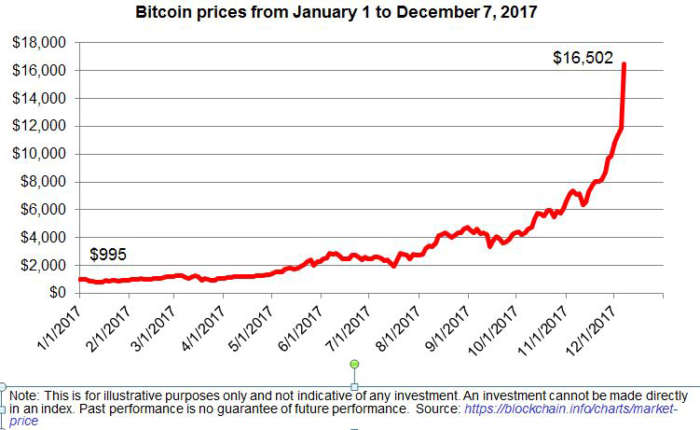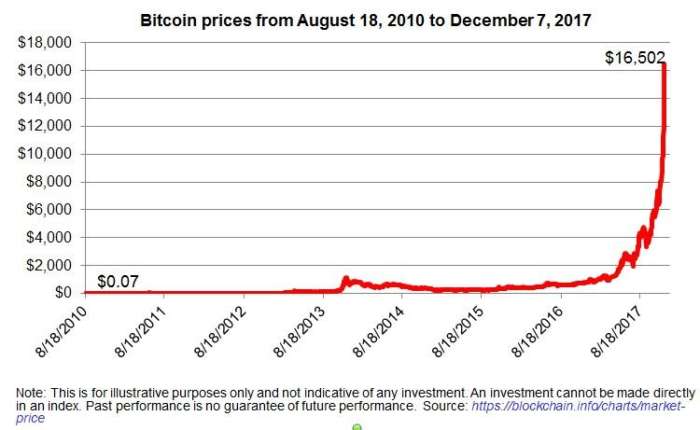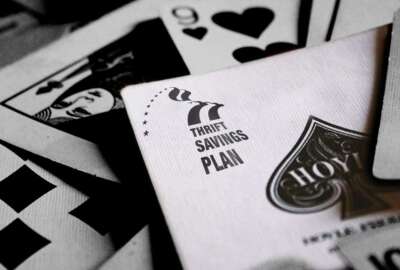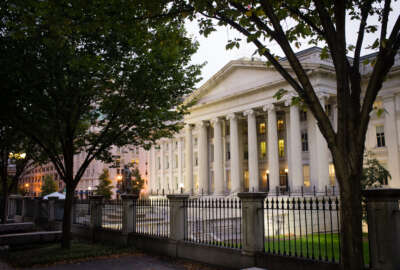
Bitcoin and the $85,000,000 pizza
If the Thrift Savings Plan offered federal employee investors a Bitcoin option, would you invest in it?
Remember a few years back when various members of Congress wanted the Thrift Savings Plan to give investors more choices? The new funds they were pushing — because of pressure from big campaign donors — included a REIT (real estate) fund, gold and silver funds, environmental funds, etc.
Now that the Bitcoin is hot, it’s only a matter of time until somebody suggests that Uncle Sam let you get into the speculation business via the TSP. We asked financial planner Arthur Stein for his take on the hot new invisible “money”. Here’s what he told us:
“Bitcoin is receiving a lot of attention. It is a ‘digital currency’ or ‘digital money.’ Prices are up 1,700 percent this year, from $952 to $17,371. Definitely impressive.

According to Investopedia, a digital currency is any form of payment that only exists in electronic form. It cannot be turned into physical money. Proponents hope that Bitcoin will someday have a stable value and replace other currencies as money.
Some stated advantages for Bitcoins as a currency include easier transfers of value between two parties, secrecy, easier to transport than physical currency or gold and no influence from central banks. Disadvantages include lack of backups and record of ownership, price volatility, theft, competition from over 1,300 other digital currencies (source: CoinMarketCap.com) and dependence on the internet.
Buying Bitcoins means you trust a currency supported by unknown people and internet sites more than the U.S. and other governments. You trust a completely unregulated internet creation with a short history to a regulated currency with a long history.
I think that Bitcoin will not make a good currency. The production of Bitcoins will end once the total number equals approximately 21 million. Once the supply is fixed, it is more likely that Bitcoins will increase than decrease in value. Therefore, no one will want to pay for anything in Bitcoins, they will always prefer to pay with dollars (or some other currency), which are expected to decrease in value because of inflation.
Price volatility already limits Bitcoin’s use as a currency. Merchants are reluctant to accept Bitcoin as payment if it might sharply decline in value. Consumers should be reluctant to spend Bitcoins if they expect them to increase in value. That may prevent Bitcoin from becoming a currency. And if Bitcoin doesn’t work well as a currency, what is it good for?
Here is a cautionary tale from the New York Times on Dec. 22, 2013 :
In 2010, ‘A software programmer named Laszlo Hanyecz … persuaded someone to accept 10,000 Bitcoins in exchange for two pizzas from Papa John’s … By Mr. Hanyecz’s reckoning, the Bitcoins he had been ‘mining’ on his computer were worth about 0.003 cents apiece. He got his two pies for $30…’
Had Mr. Hanyecz paid with U.S. dollars and kept the 10,000 Bitcoins, the Bitcoins would now be worth $170,000,000, or $85,000,000 per pizza! I hope his pizzas had all the toppings.

Another cautionary tale: According to Wikipedia, ‘in early April 2013, the price per Bitcoin dropped from $266 to around $50 and then rose to around $100. Over two weeks starting late June 2013, the price dropped steadily to $70. The price began to recover, peaking once again on Oct. 1 at $140. On Oct. 2 … a flash crash to $110. The price quickly rebounded, returning to $200 several weeks later.’
Those price changes were -80 percent, +100 percent, -30 percent, +100 percent, -21 percent and +82 percent over a six-month period. How many people can accept that level of volatility? Lots of people, when prices are bouncing up. But what about when prices are bouncing down?
Sure, I wish I had sold the pizzas to Mr. Hanyecz for 10,000 Bitcoins. It would also have been great if I invested in Bitcoin when it cost $1 or even $10, $100 or $1,000.
But I didn’t. And there is a reason. I prefer my long-term investments to be in funds that own stocks. Stocks have real value. They represent ownership in companies that have factories, intellectual property, brand names, sales and usually profits.
Bitcoin pays no income and has no underlying value. At some point, it may turn out to be the Pet Rock or Beanie Baby of the second decade of this century. Speculators may make a profit, but I am not a speculator.”
It is the ‘greater fool’ strategy. People buy because they think others will pay even more in the future.”
–Arthur Stein
Nearly Useless Factoid
Luke Skywalker traveled to the swamp planet Dagobah to be trained by Jedi Master Yoda.
Source: Sabotage Times
Copyright © 2025 Federal News Network. All rights reserved. This website is not intended for users located within the European Economic Area.
Mike Causey is senior correspondent for Federal News Network and writes his daily Federal Report column on federal employees’ pay, benefits and retirement.
Follow @mcauseyWFED





